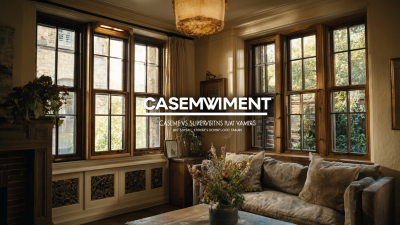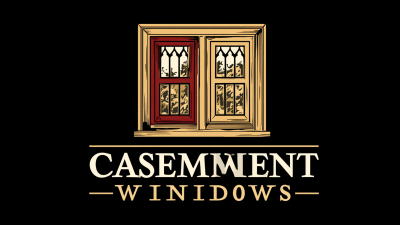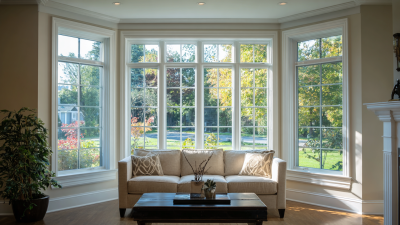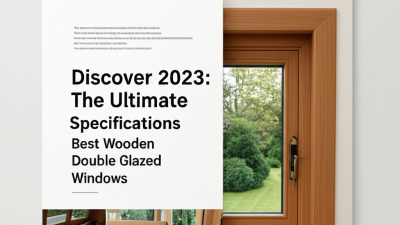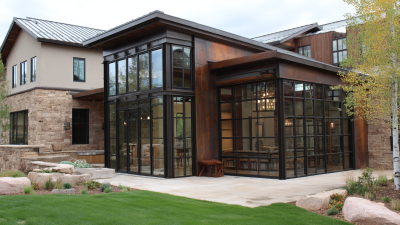In recent years, homeowners have increasingly turned their attention toward energy efficiency as a key factor in home renovation and construction. Among the various options available, casement windows stand out for their unique ability to combine aesthetic appeal with exceptional energy performance. According to the National Fenestration Rating Council (NFRC), energy-efficient windows can significantly reduce heating and cooling costs, with some studies showing savings of up to 30% on energy bills. Such statistics highlight the potential long-term financial benefits of investing in high-quality casement windows.
Industry expert and window design consultant, Dr. Sarah Thompson, emphasizes the importance of this investment by stating, "Casement windows not only enhance the beauty of a home but are also pivotal in maximizing energy efficiency, making them a smart choice for environmentally-conscious homeowners." By understanding the advantages of casement windows—such as their superior sealing capabilities and ease of use—homeowners can make informed decisions that lead to reduced energy consumption and improved comfort in their living spaces.

As we delve deeper into the specifics of energy-efficient casement windows, this guide will shed light on how these windows can transform your home, providing not only cost savings but also a greater contribution to sustainable living.
Energy efficient casement windows are increasingly becoming a popular choice among homeowners, driven by their impressive performance metrics. According to a report from the U.S. Department of Energy, well-constructed casement windows can reduce energy loss by up to 10-15% when compared to traditional double-hung windows. Their design, which opens outward like a door, creates a tighter seal when closed, minimizing air leaks and ensuring optimal insulation. This tight seal is crucial during extreme weather conditions, promoting a comfortable indoor climate year-round.
Moreover, studies from the Efficient Windows Collaborative indicate that energy efficient casement windows can significantly lower heating and cooling costs. Homes equipped with these windows can save anywhere from $126 to $465 annually in energy bills, depending on geographic location and local climate. With low U-factor ratings, casement windows help in maintaining a stable indoor temperature, which not only enhances overall comfort but also contributes to sustainable living practices. The investment in energy efficient casement windows not only pays off in immediate savings but also adds long-term value to the home, ensuring a wise choice for homeowners looking to improve energy efficiency.
When choosing windows for energy efficiency, understanding U-factor ratings is essential. The U-factor measures the rate of heat transfer through a window, with lower values indicating better insulating properties. This rating reflects how well a window prevents heat from escaping during colder months and minimizes heat gain in warmer months. In essence, a window with a low U-factor can significantly reduce your heating and cooling costs, making it a crucial consideration for homeowners aiming to create an energy-efficient environment.
Casement windows often exhibit strong U-factor ratings due to their unique design and secure sealing mechanisms. Unlike traditional double-hung windows, casement windows open outward, which allows for a tighter seal when closed, reducing air leakage. This feature not only enhances the window’s insulating capabilities but also promotes better ventilation, ensuring fresh air enters your home without compromising thermal performance. By opting for energy-efficient casement windows, you can enhance your home's comfort while contributing to sustainable energy practices.
When selecting casement windows for your home, the Energy Star certification plays a crucial role in ensuring energy efficiency and performance. According to the U.S. Environmental Protection Agency, homes that utilize Energy Star certified products can save up to 30% on heating and cooling costs. Casement windows are particularly effective due to their design, which allows them to seal tightly when closed. This minimizes drafts and contributes to a more stable indoor climate, ultimately reducing energy consumption.
In addition to cost savings, Energy Star certified casement windows come with performance ratings that indicate their effectiveness in insulating against heat loss and gain. The National Fenestration Rating Council (NFRC) reports that energy-efficient windows can reduce energy bills by an average of $465 annually, depending on regional climates. By choosing windows with the Energy Star label, homeowners not only enhance their comfort but also increase their property’s value, making it a wise investment in both energy efficiency and aesthetics. This makes Energy Star certification an essential consideration for anyone looking to improve their home's energy efficiency through new window installations.
When considering home renovations, energy-efficient casement windows stand out due to their significant cost-saving benefits. According to the U.S. Department of Energy, upgrading to energy-efficient windows can reduce energy bills by 7-15%, depending on your geographical location and home energy use pattern. This reduction in utility expenses comes from improved insulation and reduced energy consumption, allowing homeowners to recoup their investment over time.
In a report by the National Renewable Energy Laboratory, it was noted that energy-efficient windows can potentially save the average homeowner between $126 to $465 annually on energy costs. These windows are designed with advanced glazing technologies and materials that enhance thermal performance, keeping homes warmer in winter and cooler in summer. As energy prices continue to rise, the installation of these windows not only promotes a more sustainable lifestyle but also offers long-term financial relief, making it a practical choice for budget-conscious homeowners.
Casement windows are increasingly recognized for their potential to enhance home comfort, particularly through effective noise reduction and temperature control. According to a report by the National Fenestration Rating Council (NFRC), casement windows can provide noise reduction coefficients (NRC) as high as 0.45. This means that these windows can effectively dampen external sounds, creating a quieter indoor environment which is particularly beneficial for homes situated near busy roads or urban areas.
In addition to their noise reduction capabilities, casement windows offer exceptional thermal performance. The U.S. Department of Energy indicates that energy-efficient casement windows can reduce heating costs by up to 15% when compared to traditional single-pane windows. Their airtight seal when closed minimizes air leakage, ensuring that homes remain comfortable throughout the year, regardless of external weather conditions. This dual benefit of sound insulation and energy efficiency makes casement windows a smart investment for homeowners seeking improved comfort and lower energy bills.
| Feature | Description | Benefits |
|---|---|---|
| Energy Efficiency | Windows designed to minimize heat loss and optimize insulation. | Lower energy bills and reduced environmental impact. |
| Noise Reduction | Sealed design that reduces sound transmission from outside. | Increased home tranquility and comfort. |
| Temperature Control | Maintains stable indoor temperatures regardless of outdoor climate. | Enhanced comfort year-round, minimizing reliance on heating/cooling systems. |
| Aesthetic Appeal | Available in various styles and finishes, complementing home design. | Increased property value and visual attractiveness. |
| Durability | Constructed with high-quality materials that resist weather elements. | Long-lasting performance and reduced maintenance costs. |
